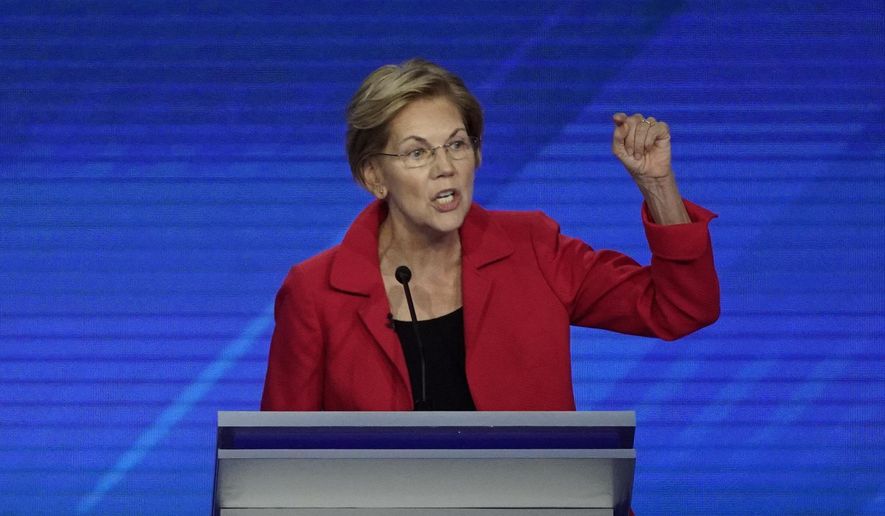Sen. Elizabeth Warren on Monday announced a new set of policy priorities designed to root out public corruption, including a ban on presidents and members of Congress from ever becoming lobbyists and sweeping new rules for lobbyists themselves.
Under Ms. Warren’s proposal, presidents, vice presidents, members of Congress, federal judges and Cabinet secretaries would be banned from ever becoming lobbyists. Other federal employees would be barred from lobbying their former office or agency after they leave the government for at least two years, or six years for corporate lobbyists.
“The goal of these measures is straightforward: to take power away from the wealthy and the well-connected in Washington and put it back where it belongs — in the hands of the people,” the Massachusetts Democrat and 2020 presidential candidate said in a Medium post.
Lobbyists would be banned from making political contributions, “bundling” donations for candidates or hosting fundraisers for candidates under the plan.
Ms. Warren also would expand the definition of lobbyist to include “everyone who is paid to influence lawmakers” and ban private lobbying for foreign governments, foreign individuals and foreign companies.
Ms. Warren also wants to impose a new tax on any entity that spends more than $500,000 per year on lobbying, create a new “Office of Public Integrity,” and change definitions in bribery statutes to try to curb the peddling of government access.
One congressman-turned-lobbyist, former Republican Rep. Thomas M. Davis III, panned the idea Monday, saying such efforts usually don’t work as intended.
“The more that you demonize it, the less transparency that you’re going to get … they find loopholes in terms of why they don’t have to register,” he said. “I mean, this is all PR … like it or not, these are people who know a lot about what’s going on.”
Paul Miller, president of the National Institute for Lobbying & Ethics, said people are upset with Washington because Congress has become too politicized — not because of special interests or lobbyists.
“The senator wants to place blame on lobbyists and interests she disagrees with,” Mr. Miller said. “This is politics and not about doing the right thing. It’s about scoring points with the public to win a nomination and election.”
Ms. Warren, who has already pushed anti-corruption proposals in the Senate and on the presidential campaign trail, also wants to ban members of Congress and senior government officials from owning or trading individual stocks, suggesting instead that they invest in “conflict-free” mutual funds or funds managed by the federal Thrift Savings Program.
She would ban members of Congress and senior congressional staff from serving on corporate boards, whether the positions are paid or not, would require members of Congress to disclose any financial conflicts before they take office, and would automatically disclose the tax returns of federal candidates and officeholders to the public.
President Trump has resisted releasing his personal tax returns, citing an ongoing audit, and is now ensnared in a legal battle with congressional Democrats over disclosure of the returns.
Ms. Warren also wants to step up disclosure requirements for “political intelligence” firms and impose criminal penalties on former public officials who use “insider” political information to make investments or advise other people who do.
She also would strengthen ethics and disclosure requirements for federal judges, including Supreme Court justices.
She timed the release of her latest proposal with a planned speech in New York City near the site of the former Triangle Shirtwaist Factory.
“No matter what brings you into this fight — whether it’s child care, student loans, health care, immigration, or criminal justice, one thing is crystal clear: corruption is making it worse — and it’s at the root of the major problems we face as a democracy,” she said.
The anti-corruption proposals came on the same day that Ms. Warren won the endorsement of the Working Families Party, as she vies for the mantle of the clear liberal alternative to former Vice President Joseph R. Biden in the race for the 2020 Democratic presidential nomination.
“Sen. Warren strikes fear into the hearts of the robber barons who rigged the system, and offers hope to millions of working people who have been shut out of our democracy and economy,” said Maurice Mitchell, national director of the liberal political group. “Our job now is to help Sen. Warren build the mass movement that will make her transformational plans a reality.”
The group endorsed Sen. Bernard Sanders, one of Ms. Warren’s top 2020 Democratic rivals, for president in 2016.
• David Sherfinski can be reached at dsherfinski@washingtontimes.com.




Please read our comment policy before commenting.